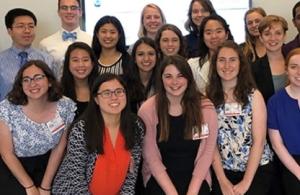
When are the summer internships?
Internships span 10 weeks over the summer following the course. It typically starts from the day after memorial day to the first week of August.
Applications typically open in Fall for the following Summer.
Where are they?
Students are placed in Congressional offices, committees, and organizations, federal agencies, international organizations, and non-governmental organizations in Washington D.C.
Past placement organizations include:
- Senators' and Representatives' Offices;
- White House Office of Science and Technology Policy, National Institutes of Health, National Science Foundation, Department of Defense;
- Embassy of France, European Union Delegation, World Bank Pan American Health Organization;
- National Academies of Sciences, Engineering, and Medicine, Woodrow Wilson International Center for Scholars, Electronic Privacy Information Center, American Association for the Advancement of Science.
Housing
Students have access to free housing at George Washington University apartments. Participants who work in government agencies on unpaid internships will receive a $3000 stipend from the University of Virginia.
The Policy Internship Program has a longstanding tradition in collaboration with Massachusetts Institute of Technology (MIT), which means students from UVA and MIT get to live in the dorms together and create great memories alongside their peers.
What to Expect
During their placement, students work on a wide variety of science and technology policy issues in which they often tap into their engineering skills. Students have written policy papers on space tourism, mine detection technologies, innovation policy, STEM issues, emerging technologies such as synthetic biology and blockchain, fracking, bioterrorism, privacy and intellectual policy, biomedical ethics, high magnetic field, and many, many others.
Students will also participate in a speaker series with high-ranking policy makers such as the Vice Chairman of the Joint Chiefs of Staff, the U.S. Surgeon General, and the Clerk of the Supreme Court of the United States.
Students also engage in a variety of social activities including visiting museums, canoeing and camping, attending concerts, touring museums, and going to baseball games. Past activities also include (for most people) a once-in-a-lifetime experience of visits and tours to places like the National Science Foundation, Congressional Research Service, the Laboratory Division, Operational Technology Division, and FBI Academy.